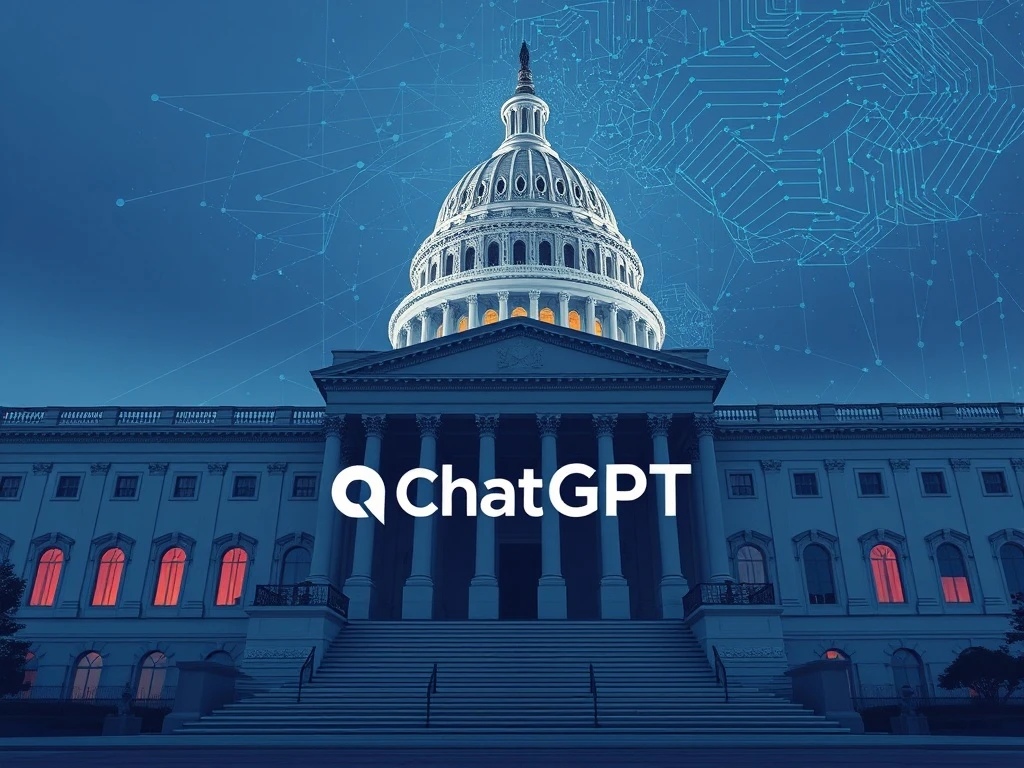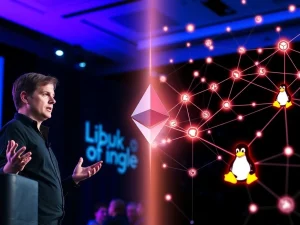Revolutionary US Government AI: ChatGPT Integration Sparks Critical Debate

The landscape of technology continuously evolves, profoundly impacting every sector. For those within the cryptocurrency space, understanding these shifts is crucial. Centralized advancements, like the recent US government AI initiatives, often highlight the very issues decentralized technologies aim to solve. A significant announcement recently emerged, detailing the US government’s plan to integrate ChatGPT across its federal agencies. This move signals a monumental shift in government operations, promising modernization while simultaneously raising critical questions about data, privacy, and control. This article delves into the specifics of this ambitious project, its potential benefits, and the significant concerns it generates, particularly concerning AI data privacy and the future of government technology.
US Government AI Embraces OpenAI for Modernization
The US government recently finalized a landmark deal with OpenAI. This agreement aims to provide the enterprise-level version of the ChatGPT platform to all federal agencies. The primary goal is to “modernize” operations across various departments. This initiative directly supports the White House’s ambitious strategy to position the United States as the global leader in artificial intelligence. This vision, known as the AI Action Plan, outlines a three-pillar approach to foster US leadership in AI development.
Under the terms of this groundbreaking deal, every US government agency will gain access to the powerful AI platform. The cost is a symbolic $1 per agency. This nominal fee facilitates the rapid integration of AI into diverse workflow operations. The US General Services Administration (GSA), the government’s procurement office, announced this partnership. They emphasized its direct alignment with the administration’s recently disclosed AI Action Plan. This strategic move highlights a concerted effort to leverage advanced AI for public sector efficiency.
The deal’s announcement comes amidst growing global competition in AI development. Nations worldwide are investing heavily in artificial intelligence capabilities. Therefore, this strategic partnership underscores the US commitment to maintaining a competitive edge. It aims to harness cutting-edge AI for national benefit. OpenAI CEO Sam Altman previously advocated for significant US investment in AI. He stressed its importance during a January press conference with US President Donald Trump. This historical context provides insight into the long-term vision driving this substantial ChatGPT integration.
Navigating the New Federal AI Policy Landscape
The implementation of this new federal AI policy marks a pivotal moment for government operations. Agencies anticipate improved efficiency, enhanced data analysis, and streamlined public services. For instance, AI could automate routine tasks, allowing human employees to focus on more complex issues. It might also accelerate data processing, providing quicker insights for policy decisions. Furthermore, citizen services could become more accessible and responsive. AI-powered chatbots could handle inquiries, reducing wait times and improving user experience.
However, the rapid adoption of AI by governmental bodies also introduces significant challenges. Critics quickly voice concerns about potential negative implications. These include profound impacts on privacy, data protection policies, and cybersecurity. Questions also arise regarding censorship, narrative control, and the preservation of civil liberties. The very nature of large language models (LLMs) requires vast amounts of data for training. This data collection process raises eyebrows among privacy advocates. The centralized nature of current AI service providers further compounds these concerns. This centralized structure creates single points of failure, making systems vulnerable to breaches. Therefore, balancing innovation with robust safeguards becomes paramount for the success and public acceptance of this government technology.
Critical AI Data Privacy Concerns Emerge
The deployment of AI tools like ChatGPT within government agencies immediately brings AI data privacy to the forefront. These concerns are not theoretical; they stem from real-world examples. In 2023, the US Space Force, a military branch, temporarily halted its use of generative AI tools, including ChatGPT. This pause occurred due to cybersecurity worries regarding sensitive data critical to national security. Lisa Costa, then deputy chief of space operations for technology and innovation at Space Force, stated that LLMs and AI service providers needed to significantly overhaul their data protection standards before widespread military adoption.
The core issue lies in how large language models and AI chatbots function. They ingest massive quantities of user data. This data comes from the internet and from conversations with willing users. This constant intake trains and refines the AI. The cybersecurity risks associated with storing this information on centralized servers form the root of privacy concerns. Users, tech executives, and civil liberties activists consistently voice these fears. OpenAI CEO Sam Altman himself recently issued a stark warning: ChatGPT conversations could potentially be used as evidence against a user in a court of law. He emphasized that AI conversations currently lack any form of privacy protections. They remain subject to government search and seizure laws. This revelation underscores the urgent need for comprehensive data governance frameworks within this new federal AI policy.
The Broader Implications of Government Technology
Public apprehension about automating government work with AI continues to grow as the AI industry matures. A notable example involved Sweden’s Prime Minister, Ulf Kristersson. He faced criticism after admitting to consulting AI for policy decisions. While his spokesperson, Tom Samuelsson, clarified that Kristersson did not use AI for classified or national security-related matters, the incident highlighted public sensitivities. It underscored the ethical dilemmas surrounding AI’s role in governance. Such instances reinforce the demand for transparency and accountability in AI deployment. They also fuel the debate on the appropriate boundaries for AI in sensitive governmental functions. The implications extend beyond data security; they touch upon the very fabric of democratic processes.
The ongoing AI race among nation-states presents both opportunities and perils. While nations strive for technological supremacy, the potential for negative consequences looms large. These include:
- Privacy Violations: Unchecked data collection and use.
- Data Protection Failures: Vulnerabilities in centralized systems.
- Censorship & Narrative Control: AI influencing information dissemination.
- Cybersecurity Threats: Increased attack surfaces for critical infrastructure.
- Civil Liberties Erosion: Automated surveillance and decision-making.
- Governance Challenges: Accountability for AI-driven policy.
These concerns highlight the complex ethical and societal questions accompanying widespread US government AI adoption. The imperative for robust regulatory frameworks and ethical guidelines becomes increasingly clear. Only then can the benefits of AI be realized without compromising fundamental rights and democratic principles. The global push for AI leadership must proceed with caution and foresight.
Decentralized AI: A Potential Counterbalance to Centralized Government AI?
The concerns surrounding centralized government technology adoption, particularly regarding privacy and control, resonate strongly within the cryptocurrency and blockchain communities. Decentralized AI (DeAI) projects offer an alternative paradigm. These initiatives aim to distribute control, enhance transparency, and bolster security by leveraging blockchain technology. In a DeAI model, data processing and model training might occur across a network of independent nodes, rather much like a distributed ledger. This approach could potentially mitigate the risks associated with single points of failure and centralized data storage.
For example, instead of a single entity like OpenAI holding vast amounts of sensitive government data, a decentralized network could encrypt and distribute data. This would make it far more resilient to breaches. Furthermore, the transparency inherent in blockchain could allow for auditable AI algorithms, addressing concerns about censorship or narrative control. While DeAI is still in its nascent stages compared to mainstream AI, its principles offer a compelling vision for a more secure and privacy-preserving future for AI. The ongoing debate surrounding ChatGPT integration in government may inadvertently accelerate interest and investment in these decentralized alternatives, offering a different path forward for public sector AI solutions.
The Path Forward for Federal AI Policy and Regulation
The federal AI policy outlined by the White House and spearheaded by the GSA signals a firm commitment to AI adoption. However, this commitment must be tempered with comprehensive regulatory measures. The lessons from past technological revolutions teach us that innovation without proper oversight can lead to unforeseen negative consequences. For AI, these consequences could be particularly severe given its pervasive nature and ability to influence critical decision-making processes.
Policymakers must consider several key areas for future regulation:
- Data Governance: Establishing clear rules for data collection, storage, and usage by government AI systems.
- Algorithmic Transparency: Requiring explainability for AI models used in sensitive governmental functions.
- Accountability Frameworks: Defining who is responsible when AI systems make errors or cause harm.
- Cybersecurity Standards: Implementing stringent protocols to protect AI infrastructure from attacks.
- Civil Liberties Safeguards: Ensuring AI deployment does not infringe upon fundamental rights.
These regulatory efforts will be crucial for building public trust in US government AI initiatives. They will also ensure that the benefits of AI are realized responsibly. The integration of advanced AI into federal operations is an irreversible trend. Therefore, proactive and thoughtful regulation is essential to navigate this complex technological frontier safely and effectively. The journey of ChatGPT integration into government is just beginning, and its trajectory will depend heavily on the frameworks put in place to govern its use.
Conclusion: Balancing Innovation with Responsibility in Government Technology
The US government’s decision to pursue widespread ChatGPT integration across its agencies marks a significant moment in the evolution of public sector technology. This ambitious step aims to modernize operations and solidify the nation’s position as a leader in artificial intelligence. The potential for increased efficiency and improved public services is substantial. However, this forward momentum is accompanied by serious and valid concerns. Questions surrounding AI data privacy, cybersecurity, civil liberties, and governance demand careful consideration. The experiences of other entities, like the US Space Force and the Swedish government, serve as cautionary tales, highlighting the need for robust safeguards.
As the federal AI policy takes shape, a balanced approach remains critical. The government must embrace the transformative power of AI while simultaneously implementing stringent regulations and ethical guidelines. This dual focus will ensure that technological progress serves the public good without compromising fundamental rights or national security. The dialogue between innovators, policymakers, and the public will define the future of government technology. Ultimately, the success of this monumental undertaking will hinge on its ability to foster trust, ensure accountability, and protect citizens in an increasingly AI-driven world.






